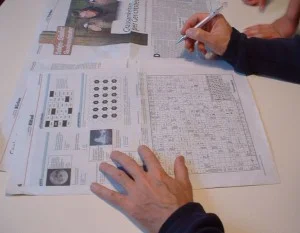 I find working with older adults to be extraordinarily rewarding. The anecdotes, the advice, the good sense – I love them all, even when they’re unsolicited. Because of all the wonderful things my older participants bring into the lab to share with me, I frequently feel the need to give something back. To that end, my research focuses on recognizing the unique abilities of older adults and on identifying those oft-overlooked ways in which memory functioning changes rather than declines in late life. However, this “advocacy through academia” has too much lag time and not enough immediate relevance to the people with whom I work. I want to be able to offer these individuals some advice of my own, the kind that they can apply during their day-to-day activities to improve their quality of life. I know exactly what these older folks want to know, too: how do I keep my memory sharp?
I find working with older adults to be extraordinarily rewarding. The anecdotes, the advice, the good sense – I love them all, even when they’re unsolicited. Because of all the wonderful things my older participants bring into the lab to share with me, I frequently feel the need to give something back. To that end, my research focuses on recognizing the unique abilities of older adults and on identifying those oft-overlooked ways in which memory functioning changes rather than declines in late life. However, this “advocacy through academia” has too much lag time and not enough immediate relevance to the people with whom I work. I want to be able to offer these individuals some advice of my own, the kind that they can apply during their day-to-day activities to improve their quality of life. I know exactly what these older folks want to know, too: how do I keep my memory sharp?
Unfortunately but unsurprisingly, there is no magic bullet. The first bit of good news, though, is that older adults, on the whole, are remarkably strategic problem solvers; those years of life experience aren’t for naught. In many domains, in the face of reduced resources or diminished capacity, older adults are able to selectively and efficiently optimize the resources/capacity they do have in ways that allow them to achieve personally meaningful goals. Sure, they may not perform as well as young adults when recalling a list of word pairs that will be immaterial outside the lab, but who cares? (In fact, older participants often remark on the “pointlessness” or “meaninglessness” of these kinds of tasks, which is, of course, frustrating to the researcher. But, it must be conceded: they’ve got a valid point…) The evidence strongly suggests that when information is valuable to the individual (i.e., a granddaughter’s severe food allergy, a physician’s phone number, remembering how to play a beloved instrument), it will be retained and recallable.
As to how to improve or maintain memory functioning more globally, the most unequivocal advice I would offer is, exercise often. And not just toning, but the kind of workout that raises your heart rate for 30 to 40 minutes at a time. Not only does it reliably improve memory performance, but it also increases anterior hippocampal volume and increases levels of BDNF, a molecule that supports the health of existing neurons and encourages the growth of new neurons and synapses. The extensive benefits of aerobic activity have been extolled for decades, and there is no reason to believe that members of the medical community will change their minds on this one.
On to the more equivocal and conditional advice. People frequently ask me whether doing crosswords or logic puzzles or even various “brain training” video games will improve their memories. To be brutally honest, no, these activities probably won’t improve the kinds of memory that people are most concerned with, like long-term or prospective memory. This problem arises because these training regimens tend to be very task-specific; the benefits don’t seem to transfer to even closely related daily tasks. Doing crossword puzzles every day will almost definitely improve your ability to do crossword puzzles and will likely augment your functional vocabulary, but it is unlikely that this kind of “brain exercise” will make you better at remembering to pick up your dry cleaning or better at remembering names at parties.
At the same time, though, sometimes these exercises may benefit other kinds of cognitive functioning. The various video games on the market designed to improve cognitive abilities (Nintendo’s Brain Age, to name one) do seem to engender broadly generalizable and long-lasting improvement in areas like visual short-term memory, task switching, and working memory. Boosting executive function in these ways certainly can’t hurt general mental ability, but it’s still no guarantee that in practical application, your long-term memory will improve.
So, then, without waffling, what is the best way to keep your memory keen? UCLA’s own legendary Coach John Wooden put it well: “Stay busy, stay active… have some variety!” Maintaining physical health is the best insurance for good mental health, no doubt. Moreover, finding mentally stimulating activities that you enjoy, be they Sudoku puzzles or video games, may not necessarily have a direct impact on your memory functioning, but these fun pastimes can augment other kinds of brain functioning and thereby indirectly support your memory.
Further Reading
Basak, C., Boot, W. R., Voss, M. W., & Kramer, A. F. (2008). Can training in a real-time strategy video game attenuate cognitive decline in older adults? Psychology and Aging, 23(4), Dec 2008, 765-777.
Erickson, K. I., et al. (2011). Exercise training increases size of hippocampus and improves memory. Proceedings of the National Academy of Sciences, 108(7), 3017-3022.
Green, C. S., & Bavelier, D. (2008). Exercising your brain: A review of human brain plasticity and training-induced learning. Psychology and Aging, 23(4), 692-701.
Dr. Alan Castel’s interview with Coach John Wooden, age 98, in APS Observer.